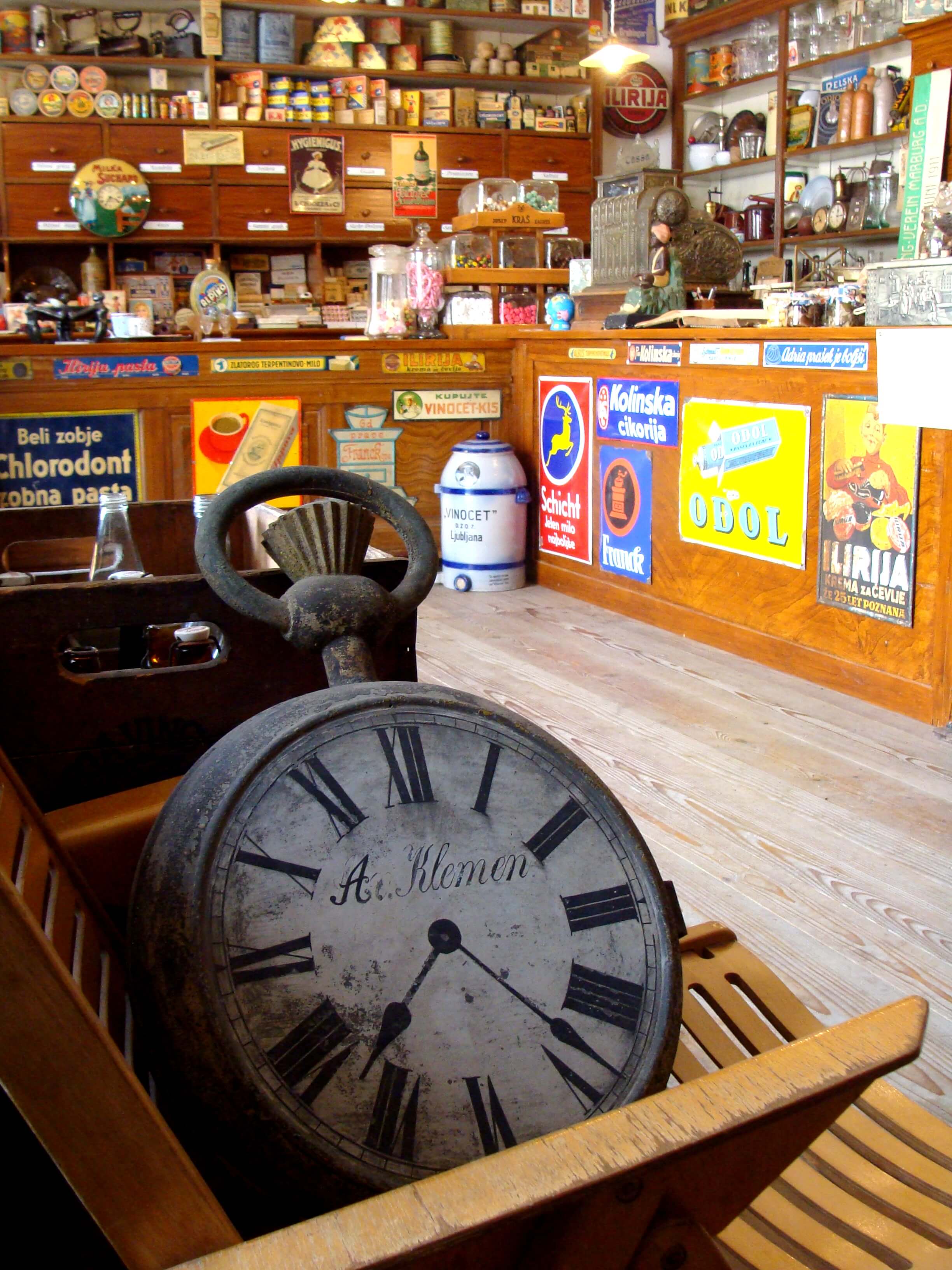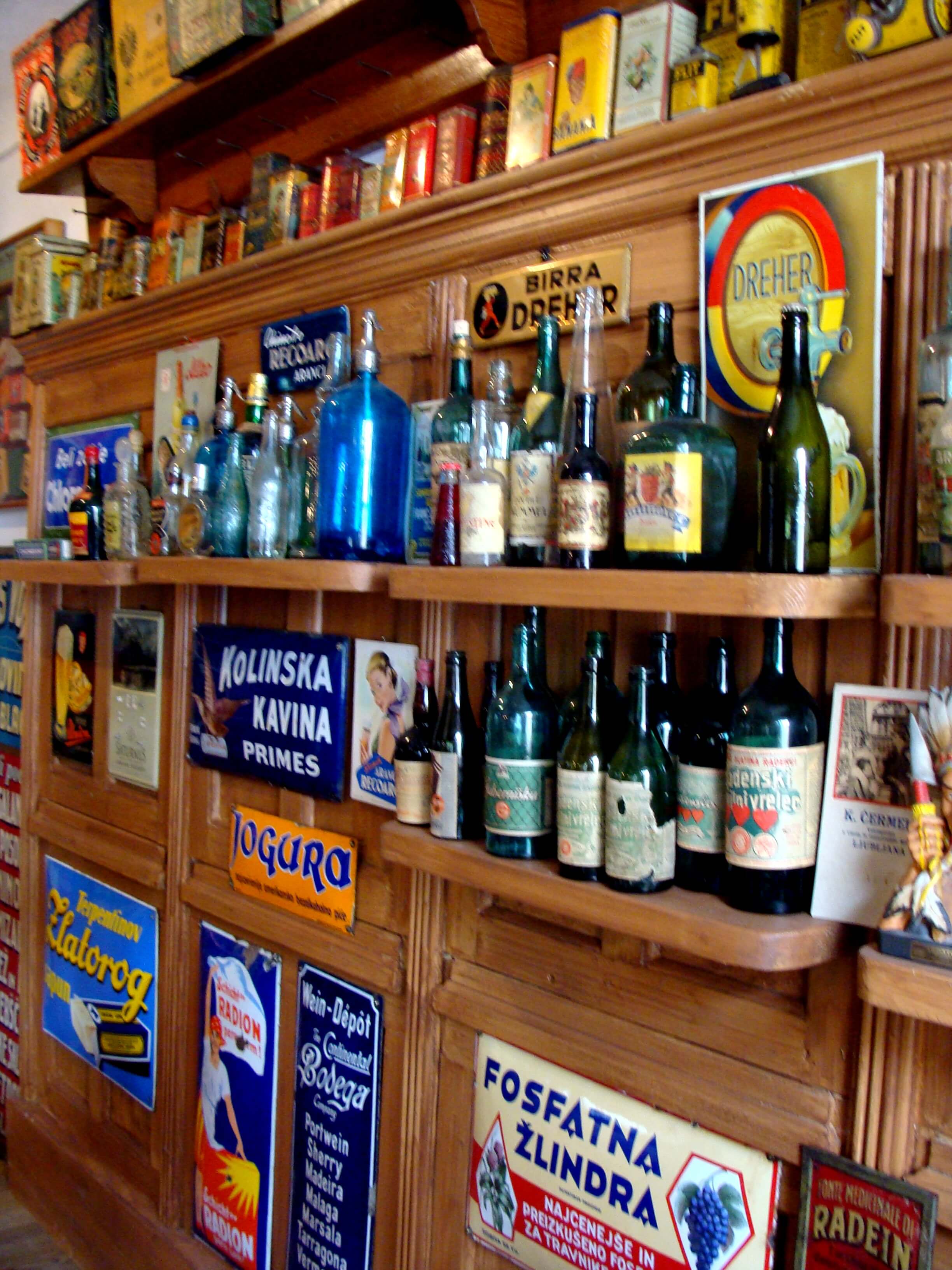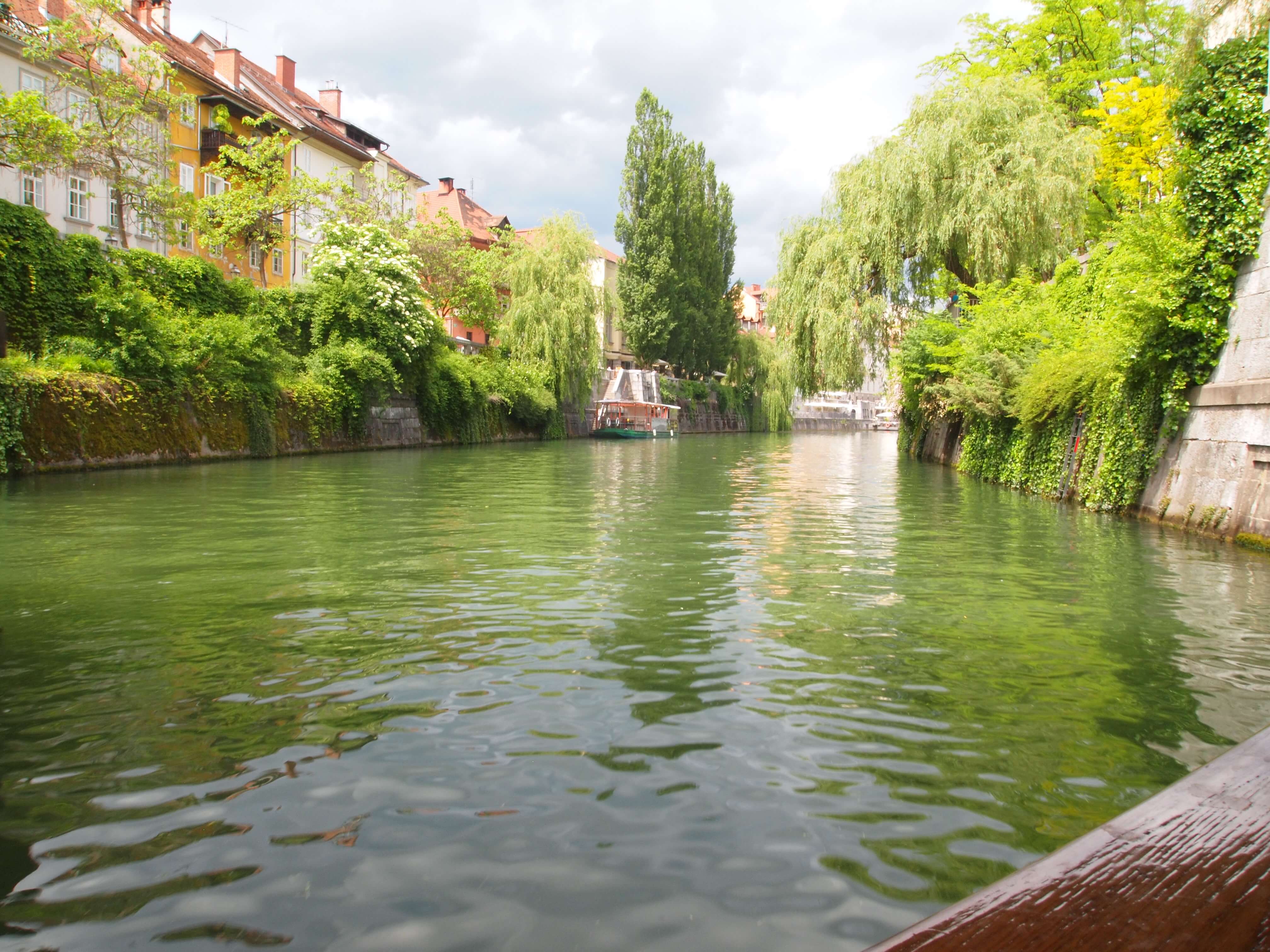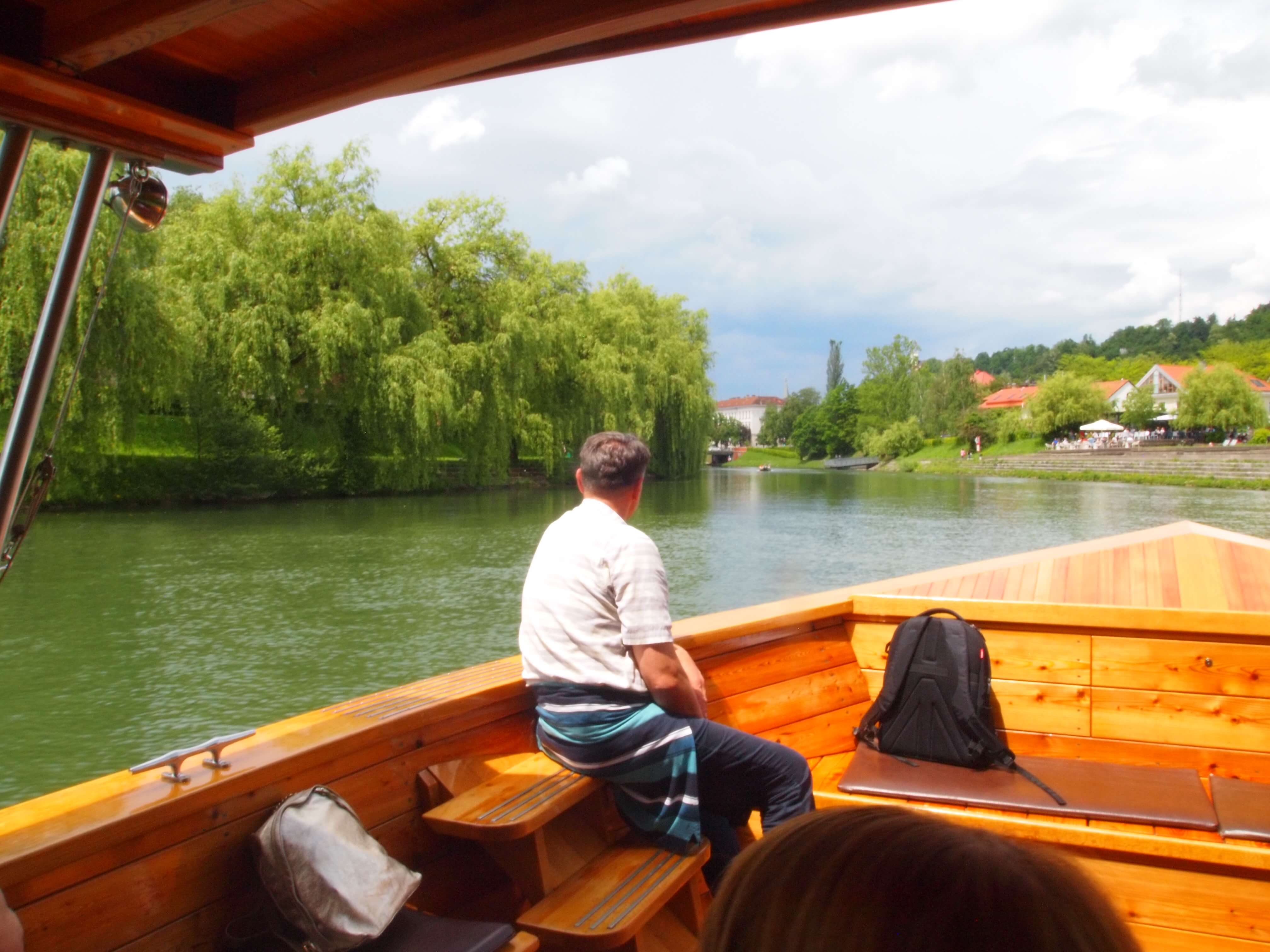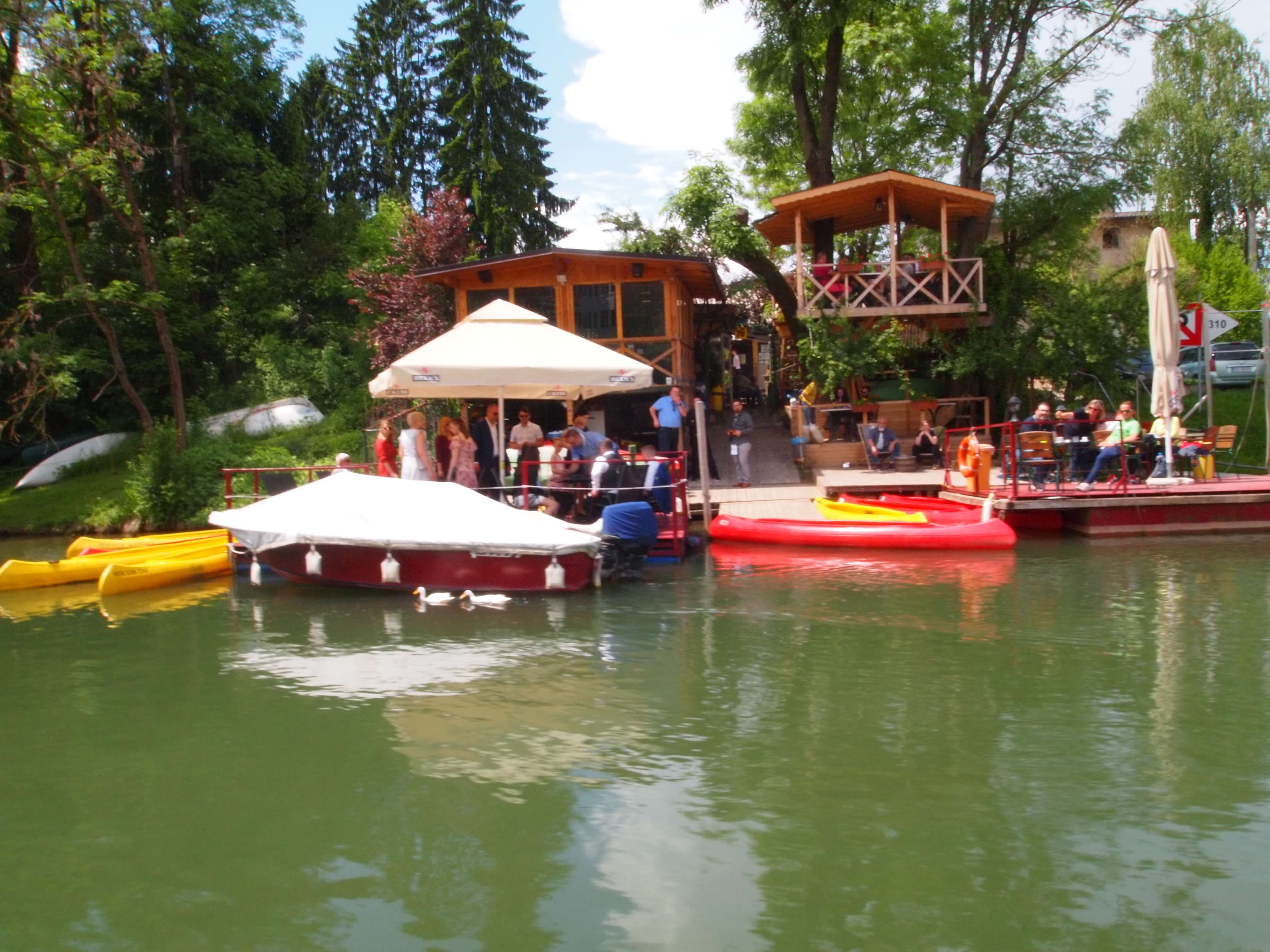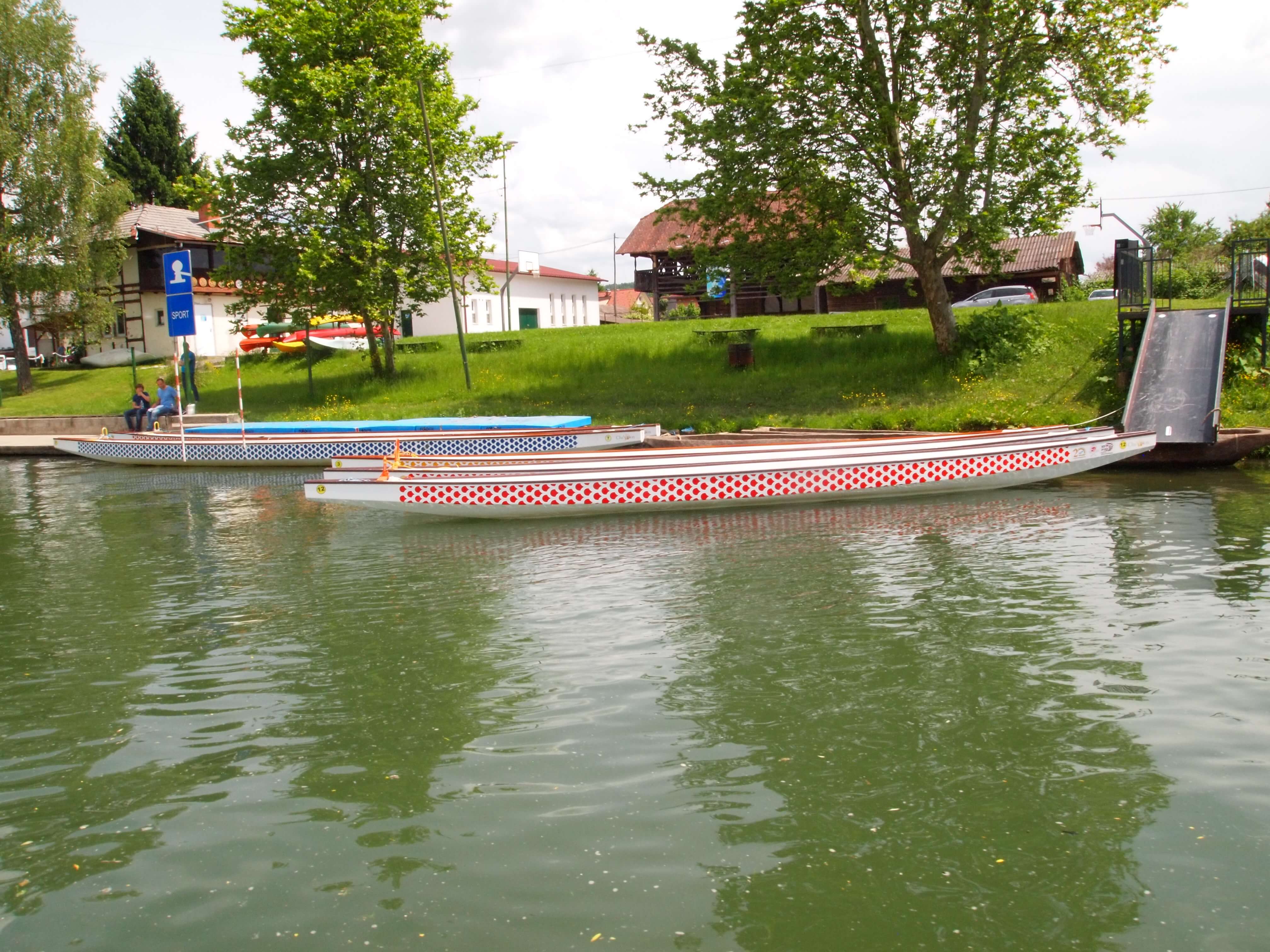News
Bookmark this link and find the headlines faster each morning, or follow us on Facebook
A schedule of all the main events involving Slovenia this week can be found here
Visiting Ljubljana? Check out what's on this week, while all our stories on Slovenia, from newest to oldest, are here
This summary is provided by the STA:
Slovenia's economy expands by 3.2% in Q1
LJUBLJANA - Slovenia's economy expanded by a robust 3.2% annual rate in real terms in the first quarter of 2019 and by as much as 3.7% when adjusted for season and working days, fresh figures from the Statistics Office showed. Although growth in real terms slowed down from the 4.1% recorded in the previous quarter, the seasonally adjusted rate was slightly above the 3.6% from the last quarter of 2018. The quarter-to-quarter slowdown was fuelled by a slowdown in domestic expenditure.
Slovenia's annual inflation rate down to 1.4% in May
LJUBLJANA - Slovenia's annual inflation rate dropped by 0.3 percentage points to 1.4% in May over April, as significantly higher prices in the group housing were offset by lower prices of alcohol, tobacco and communications, the Statistics Office said. The price group associated with housing accounted for half of the annual inflation rate. The harmonised index of consumer prices, an EU benchmark, stood at 1.6%, down from 1.8% in April.
Mercator posts Q1 group loss of EUR 3.7m as sales decline
LJUBLJANA - Mercator, Slovenia's largest retailer, posted a group net loss of EUR 3.7 million for the first quarter of 2019 compared to a net profit of EUR 1.9 million for the same period last year, as sales declined by 3.1% to just under EUR 500 million, according to preliminary results. Group operating profit (EBIT) rose 5.6% to EUR 9.6 million, with normalised profit before interest, tax, depreciation and amortisation (EBITDA) up 75% to EUR 39.7 million.
President says European Commission must preserve dialogue with W Balkans
BUDVA, Montenegro - Judging by experience, EU enlargement onto the Western Balkans will not be a key priority of the next European Commission, Slovenia's President Borut Pahor said as he addressed a security forum in Budva. However, efforts must be made to preserve dialogue and negotiations with all countries in the region. Pahor, addressing the To Be Secure conference, reiterated his position that EU enlargement towards the Western Balkans is a geo-political issue.
Slovenian, Hungarian ministers talk coop in digitalisation, AI
LJUBLJANA - Slovenian Economy Minister Zdravko Počivalšek met Hungarian Minister for Innovation and Technology Laszlo Palkovics to discuss cooperation in digitalisation and artificial intelligence, as Slovenian companies are interested in investing in the emerging automotive industry test track in Zalaegerszeg. The ministers also discussed possibilities for cooperation of Slovenian and Hungarian companies in selling their products and investing in Africa.
Legal experts find no ground to end Hungarian minority MP's term
LJUBLJANA - Parliamentary Speaker Dejan Židan and deputy group heads held a meeting with legal experts to discuss the case of Ferenc Horvath, the MP for the Hungarian minority who continues to head a body governed by public law while also serving as MP. The experts say there is no legal basis for ending the MP term of Horvath, who refuses give up his seat in parliament or resign as the head of the minority's umbrella organisation as he was urged by the anti-corruption commission.
Doctors adamant about new norms, patients not to be affected
LJUBLJANA - The trade union of doctors and dentists, FIDES, remains adamant about the implementation of new workload standards and norms from 1 June on, however, its boss Konrad Kuštrin as well as Health Minister Aleš Šabeder assured the public that the health and life of patients would not be jeopardised. Kuštrin does not expect anything dramatic to happen as doctors start adhering strictly to the norms and standards that they adopted in 2008, because of the less busy season ahead. Šabeder said that some hospitals had already adopted new standards, while most others were in the process of doing so.
Part of Oncology Institute temporarily closed due to staff shortage
LJUBLJANA - A section of the Oncology Institute had to be closed in mid-May due to a shortage of nurses. Eight nurses left the institute this year. After talking to the management, Health Minister Aleš Šabeder said the situation could not be solved overnight, as staff shortage had been a problem in health for a while. The institute director general, Zlata Štiblar Kisić, expects things to return to normal within a month.
Internal audit at BAMC finds no fault in Logatec land case
LJUBLJANA - An internal audit of the controversial sale of a plot by the state-owned bad bank to Swiss Lonstroff for an elastomer plant in Logatec has found the bad bank had not suffered any financial damage in the deal, while some employees did commit several violations, the Bank Assets Management Company (BAMC) said in a release. Potential irregularities and wrongdoing in the deal were first reported by the media last September and are still being investigated by the police. Since then, the BAMC management has been overhauled. Last month, Lonstroff cleared its Slovenia director Peter Weber of defrauding his company of EUR 1.7 million with the deal.
Ruling in MP Tomić defamation case upheld by higher court
LJUBLJANA - The Higher Court upheld a 2018 ruling by the Ljubljana Local Court ordering media company Nova Hiša, which runs the Nova24TV news portal, to pay opposition Left MP Violeta Tomić EUR 6,000 in damages for an offensive article about her. In August 2017, Nova24TV published a story headlined "Left MP Violeta Tomić in Hotpants on Vis-Bound Ferry 'Airing It Out'", accompanied by anonymous abusive comments on the social media. Both courts said that by running the story, Nova24TV had not discussed any serious matters of public interest, but discredited the plaintiff. Last year, the lawyer representing the media outlet announced appeals all the way to the European Court of Human Rights if necessary.
Several state-owned companies pledge to respect human rights
LJUBLJANA - Ten companies, most of them in state ownership, signed a pledge to respect human rights in their business operations at a business forum at the Chamber of Commerce and Industry. The initiative was launched in line with the government's action plan which lists a set of measures and recommendations for the implementation of the UN guidelines for the protection of human rights in business. Foreign Minister Miro Cerar said it was key for the the state to be capable of setting up mechanisms to protect human rights.
Unior group's net profit up over 18% in Q1
ZREČE - The group around the Zreče-based tool maker Unior posted a new profit of EUR 6.8 million in the first quarter of the year, up 18.4% over the same period in 2018. Its revenue increased by 8% to EUR 68.2 million. The group's operating profit reached EUR 7.4 million, up 13.8%, according to the unaudited first-quarter report.
Adria Mobil revenue up, profit down in six months
NOVO MESTO - Adria Mobil, one of Europe's leading caravan makers, generated EUR 226.2 million in net sales revenue between September and February, which is up 13.1% year-on-year. Net profit dropped by 11.7% to EUR 19.7 million. The company's business year runs from the beginning of September to the end of August next year in line with the policy introduced after the takeover by the French mobile homes maker Trigano at the end of 2017.
Slovenian canoeists win team event at European Championships
PAU, France- Slovenian canoeists Benjamin Savšek, Anže Berčič and Luka Božič won the team event at the European Canoe Slalom Championships in France's Pau, beating the second-placed French team by a mere 0.16 seconds. The third place went to Russia. This is the second gold medal at the European championships for Slovenia in team events, the first coming in 2014 in Vienna with the same line-up of Savšek, Berčič and Božič. The kayak team followed the success up by grabbing silver.
STA, 31 May - A search party is looking for a 23-year-old British citizen who has gone missing in the treacherous, narrow gorge of Koritnica River in the mountains of northeastern Slovenia on Thursday. A day earlier, a compatriot of his narrowly escaped death in a kayaking accident on the Soča.
According to the Nova Gorica police, the man, accompanied by another Brit, dropped his cell phone into the gorge while visiting Kluže fort, an ancient military check point positioned high above the Koritnica.
After realising that he would not be able to reach the bottom of the gorge from the fort, he and the other Brit rode some half a kilometre onward in the direction of the village of Log pod Mangartom.
While his companion waited in their van, the man went to look for his phone, the police said, adding that the terrain there was steep and dangerous, while the Kortinica water level was high due to the rain that persisted in the past weeks.
A search and rescue mission involving the police and the Mountain Rescue Service was launched immediately after the man was reported missing. His friends also joined the effort.
This happened only a day after a British kayaker almost drowned in the Soča river, some 10 kilometres south of the Kluže fort. She was a part of a group of kayakers who went into the swelling river without a guide, the police said in a separate press release on Wednesday.
She was soon turned upside-down by a strong current. She managed to free herself from under the kayak, only to get stuck behind a tree trunk. Members of the group tried to help her unsuccessfully and she was swept away once again.
Fortunately, the young woman managed to get herself out of the water further downstream.
Related: 10 ways to enjoy the River Soča
STA, 31 May 2019 - Slovenia's economy continues strong with the latest data showing that the GDP expanded at an annual rate of 3.2% in real terms in the first quarter of the year and by as much as 3.7% when adjusted for season and working days.
Although growth in real terms slowed down from the 4.1% recorded in the previous quarter, seasonally adjusted rate of growth ran slightly above the 3.6% recorded in the final quarter of 2018.
Seasonally adjusted quarter-on-quarter growth was 0.8%, data from the Statistics Office (SURS) show.
Contrary to expectations by analysts, the slowdown was not provoked by external demand as the growth of exports gathered pace compared to the previous two quarters, but rather by a slowdown in domestic expenditure.
Domestic expenditure grew by 1.8% year-on-year in the first quarter, the lowest rate of growth in at least three years, with the biggest impact coming from a 1.3% decline in gross capital formation, SURS official Romana Korenič told reporters in Ljubljana on Friday.
Changes in inventories had a markedly negative impact on GDP growth, as much as 2.1 percentage points.
Gross fixed capital formation increased by 9.3%, which is on a par with the previous quarters. Construction investment expanded by as much as 18.1% but investment in machinery and equipment slowed down to 4%.
Businesses reduced inventories by 2.1%, the reason for which is not clear yet. Korenič said a potential reason could be a drop in orders, although business sentiment data or export growth do not suggest that.
Domestic expenditure was thus fuelled only by final consumption expenditure, which grew by 2.9%, a somewhat higher rate than in the previous three quarters.
Driven mainly by an increase in public sector pay at the beginning of the year, government final consumption rose by 3.6%, whereas household consumption increased by 2.6%, however Korenič said that the latter contributed more to the final consumption growth than government spending.
The statisticians noted a slowdown in household expenditure for durable goods, in particular cars. However, daily purchases of goods such as food, beverages, fuel and some types of services increased.
After a somewhat lower growth of exports in the third and fourth quarters of last year (5.4% and 6.8%), exports expanded by 7.6% year-on-year in the first quarter.
Imports increased at a slower pace (6.4%), which resulted in high external trade surplus. This time it contributed 1.6 percentage points to GDP growth.
Employment keeps increasing but with signs of a moderation. The number of people in work in the first quarter rose by 2.6% year-on-year to 1,026,547.
Half of the new jobs were created in manufacturing and construction, with livelier hiring also observed in transport, trade, and professional, scientific and technical activities.
Running at 3.2%, growth in real terms was the slowest since the final quarter of 2016 when it ran at 3%.
In the village of Lokev, you can step back to a time and see how people shopped from the 1870s to the 1950s. Fabiani’s Museum Shop is unique in Slovenia, the only fully-preserved and equipped mixed-good store from the era. The museum was opened in 2007, and is in the same space as a store that was opened in 1869 by Jacob Fabiani.
Step inside and you’ll be greeted by a sales assistant from the 1930s who will guide you through the store and answer any questions that you have about the more 7,000 items on display. These include a varied range, such as candy, seeds, shoe creams, baking powder, vinegar, cosmetics, petroleum, stationary, sewing supplies, tobacco products, spices, washing powders, soaps, various types of coffee, paints, enamelled and galvanized containers and many more, all the things you'd expect in a mixed goods store serving a community in the days before supermarkets or department stores.
In addition to the goods that were once sold at Fabiani's there also a collection of old advertising items in the museum, with posters, statuettes, metal and cardboard billboards, as well as many other advertising products from the years covered.
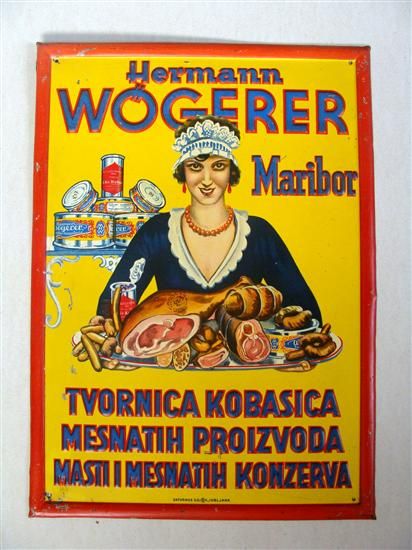
Of interest to anyone who has ever been in a shop or is curious about the past, and especially Slovenian history, a trip to Fabiani's Museum Shop in Lokev can also be combined with two other museums, as the village also has the Tabor Military Museum and the oldest prosciutto factory in the Slovene Karst, Pršutarna Lokev. There’s also the nearby Vilenca cave, and the famous white Lipica horses.
Fabianova muzejska trgovina, Lokev 118, 6219 Lokev. Website
The museum is open on Saturdays from April to November, and group trips are also possible during the week by prior arrangement. However, the owners may not always be there on Saturday, so if planning a special trip it’s best to call or email Miro first to see if the place will be open 00 386 41 976 385, miro_slana@t-2.net
Related: Verba - Yugostalgia, tours and 28 languages in Ljubljana
Life in downtown Ljubljana arranges itself around the river and its bridges, with the Ljubljanica, its regulation and the varied and various architectural interventions that cross it, giving the area much of its charm. But have you ever actually been on the water?
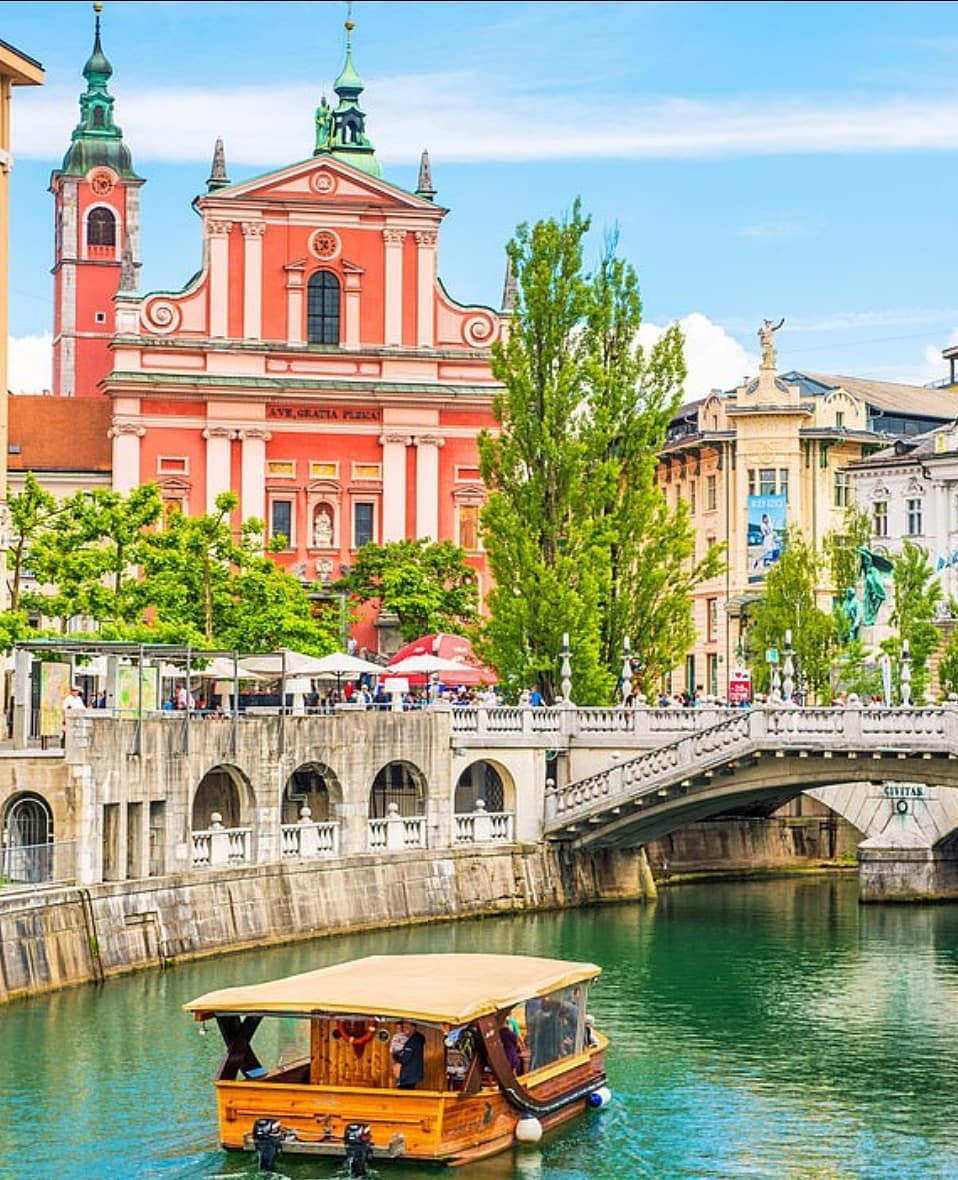
Source: Barka
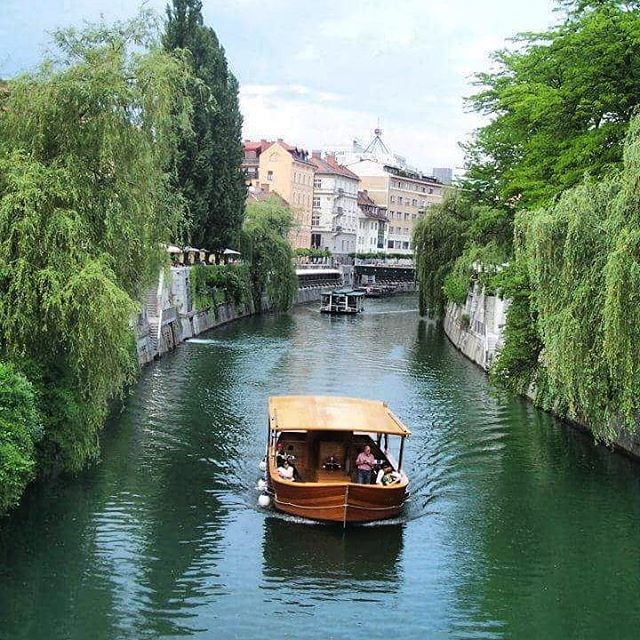
Source: Barka
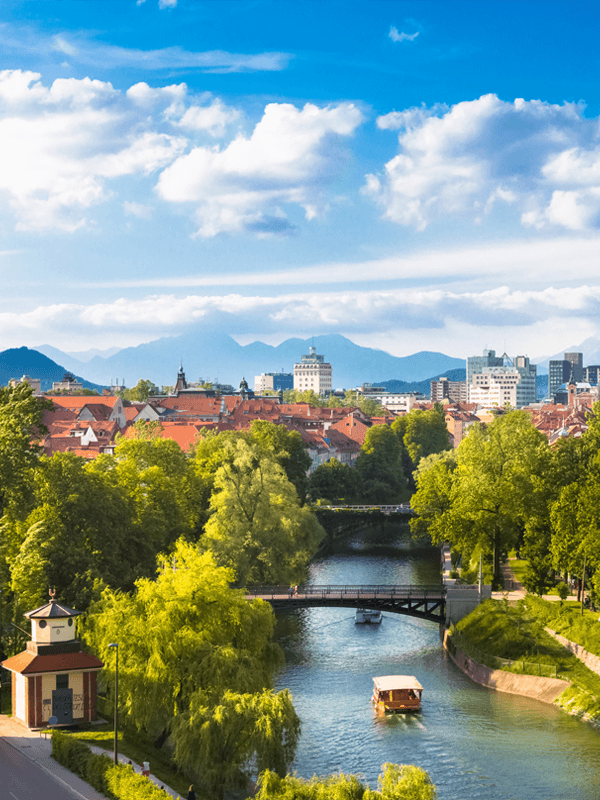
Source: Barka
I have to confess, even though I’ve lived right by the river for some years, and am supposed to engage with my environment, I’d dismissed the boats going up and down in view of my apartment as a tourist trap, little more than floating bars with a captive audience. What could they offer me beyond feeling like an idiot as people watched from the embankments?
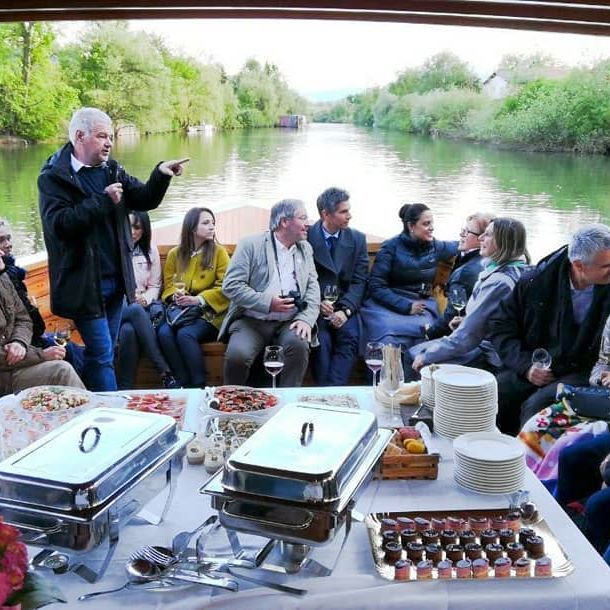
Food can be arranged for private parties, and there's a bar onboard. Source: Barka
Photo: JL Flanner
Photo: JL Flanner
But the other day I finally overcome at least one of my foolish and limiting prejudices, and took a ride on the Barka, which bills itself as the first and only wooden boat on the Ljubljanica, and one that was hand-built in Slovenia. A handsome vessel, as well as the usual boat trips and guided city tours, it can also be hired for romantic rides, closed groups, weddings or other occasions, with the option of full catering and the support of partner restaurants. It’s a nice boat, and – and the photos show here – one the complements the city itself.
The Ljubljana many don't see. Photo: JL Flanner
Photo: JL Flanner
The standard trip, as shown in the video at the end of this story, lasts 45 minutes and leaves from under the market side of Butchers Bridge (the one with the lovers’ locks). From there you head upriver, past Špica, and into the relative wilds inhabited by the canoe and sailing clubs, with idyllic looking homes that make you realise, once again, what a ridiculously nice city this is to live in. If you’re lucky you may even see some nutrija, a large water rodent that also makes its home here.
Related: In town this week? Check out what's on in Ljubljana here
Turning at Livada, the boat then heads back to the centre town, where you’ll get a good of the Castle, as well as the various bridges that connect the two parts of the Old Town. The trip then ends a little after Dragon Bridge, as it must, due to the sluice gate a hundred metres or so beyond this (a work by the architect Jože Plečnik, the man behind Špica embankment, the Triple Bridge, and Market Arcades, all seen on this trip).
In short, a boat ride along the river is highly recommended, and – to my surprise – perhaps even more so for residents than tourists, although the latter will still find much to enjoy from being on the relatively clean water, enjoying a cold beer or glass of wine, looking up at the people on the riverbanks and wondering if they know what they’re missing. You can learn more about Barka’s trips here, or just look out for the nice wooden boat.
STA, 30 May 2019 - Former Foreign Minister Karl Erjavec suggested on Thursday that interviews conducted by the parliamentary Intelligence Oversight Commission had confirmed he had been in no way involved in the border arbitration incident with Croatia. He called that commission's chair Matej Tonin a "notorious liar" who is abusing his post and hurting Slovenia.
Erjavec commented after today's government session on Tonin's claim, made after Wednesday's session of the commission, that the testimonies by two former directors of Slovenian intelligence agency SOVA and that of arbitration agent Simona Drenik did not add up.
While the commission plans to continue the investigation into the phone conversations - believed to have been recorded by Croatian intelligence - between the Slovenian arbitration agent and the Slovenian member of the arbitration tribunal, Erjavec said he hopes "Tonin's lying will finally end".
Erjavec, who is now serving as defence minister while he was foreign ministry when Croatia published the phone conversations in 2015 and used them as an excuse to pull out of the arbitration process, said he had to listen to accusations he had caused the scandal for four years.
After allegations that Croatian intelligence services had something on Erjavec and were extorting him and reproaches related to his weekend house in Croatia, Tonin has recently led those peddling the allegation that the collusion between judicial agent Drenik and arbiter Jernej Sekoloec had been ordered by the minister, Erjavec said.
The minister, who heads the Pensioners' Party (DeSUS), added Drenik had said on Wednesday that no pressure had been exerted on her. "However, somebody is making misleading statements all the time and creating a big show out of this," Erjavec added.
He pointed out that Sekolec, interviewed by the commission on Thursday along with Drenik and former SOVA director Andrej Rupnik, had acknowledged he had made a mistake and had expressed regret.
Erjavec expects that Tonin, who is the president of the opposition New Slovenia (NSi), will "stop abusing" his leading post on what is a very important commission.
Tonin responded to the accusations by saying that it was understandable that those involved in the arbitration fiasco would like to forget about it all as soon as possible.
However, irregularities occurred, this was also confirmed by the arbitration tribunal, and finding out the truth cannot undermine Slovenian interests while it can prevent such mistakes from repeating, Tonin wrote.
He said it was the commission's duty to find out whether SOVA had properly trained and equipped people at the Foreign Ministry and to draw up a report on how to remedy potential shortcomings.
Tonin said the commission had also received this mandate with votes from the coalition, and that everyone testifying before the commission was doing so voluntarily, which makes any accusation of abuse indecent and foul.
What is more, "Minister Karl Erjavec knows that I cannot speak publicly about the details, which is presently allowing him to attack the work of the commission and me personally". Tonin said the final report of the commission would serve as the best answer to the minister's offensive remarks.
Meanwhile, speaking to TV Slovenija in the evening, Drenik said she felt the reviving of the scandal was a political stunt.
Surprised by Tonin's claim her testimony did not match that of the former SOVA directors, Drenik repeated she had answered the question of the commission within the confines of the commission's mandate.
Drenik said she had been convinced during the conversation with Sekolec that she had been sufficiently protected, but added that she saw things differently today. "We would have acted differently today," she said.
"It is clear, and I'm convinced this is the case, that Slovenia was not the only party that was involved in such ex-parte communication, but there is no direct evidence for this," Drenik also said.
Still, Drenik is content with how things ended, as the arbitration tribunal dismissed this "procedural complication" as not grave enough to derail the procedure and Slovenia got an arbitration result it can be happy with.
STA, 30 May 2019 - The government has taken a key step towards the creation of a state-owned tourism holding by confirming on Thursday an investment document facilitating the transfer of several tourism companies onto a special company.
The confirmed investment document allows the Bank Assets Management Company (BAMC) to incorporate a special purpose vehicle onto which shares of Istrabenz Turizem, owner of six coastal hotels, will be transferred.
This company will form the basis of the State Hospitality Fund, which is "key to the continued consolidation of Slovenian tourism," the government said.
The State Hospitality Fund will be created to pool together the assets of several partially or wholly state-owned tourism firms that are individually weak but will have significantly better investment potential when merged.
Once the firms are consolidated, they will be sold in what Economy Minister Zdravko Počivalšek has described as "reasonable privatisation".
The State Hospitality Fund will feature assets of Istrabenz Tourizem, Sava Turizem, Hoteli Bernardin, Adria Turistično podjetje, Hit, Thermana, Unitour and Terme Olimia spanning hotels, spas, campsites and ski resorts.
Bookmark this link and find the headlines faster each morning, or follow us on Facebook
A schedule of all the main events involving Slovenia this week can be found here
Visiting Ljubljana? Check out what's on this week, while all our stories on Slovenia, from newest to oldest, are here
This summary is provided by the STA:
Pahor and Đukanović talk W Balkans, Montenegro's EU prospects
PODGORICA, Montenegro - President Borut Pahor met his Montenegrin counterpart Milo Đukanović as he started his official visit to the country. They talked about the situation in the Western Balkans and exchanged views on the progress of Montenegro's talks to join the European Union, the president's office said in a press release. He also met Speaker Ivan Brajović and Prime Minister Duško Marković.
Govt formally aborts Mura power project
LJUBLJANA - The government formally aborted plans to build hydro power stations on the river Mura in the north-east. The decision, expectedly inviting mixed responses, was taken after the former environment minister announced in January the project was not viable due to environmental concerns. The Environment and Spatial Planning Ministry said it examined three proposed options for the new facility, finding them all environmentally inappropriate. The local environmental initiative welcomed the decision, while the power utility Dravske Elektrarne Maribor (DEM), which was planning to build the facility regretted it.
Erjavec feels exonerated in arbitration scandal, calls Tonin notorious liar
LJUBLJANA - Former Foreign Minister Karl Erjavec suggested that interviews conducted by the parliamentary Intelligence Oversight Commission had confirmed he had been in no way involved in the border arbitration incident with Croatia. He called that commission's chair Matej Tonin a "notorious liar" who is abusing his position and hurting Slovenia by saying that the testimonies by two former directors of Slovenian intelligence agency SOVA and that of arbitration agent Simona Drenik did not add up. Drenik assessed that the revisiting of the arbitration wiretap scandal was politically motivated.
Police union clashes with minister in Schengen border debate
LJUBLJANA - The emergency session of the parliamentary Home Policy Committee called to discuss policing the Schengen border saw a bitter exchange between a police trade union, jointed by the opposition Democrats (SDS), and Interior Minister Boštjan Poklukar, who likened the union to para-police. The committee chair Zvonko Černač, a deputy for the SDS who initiated the debate, argued that the government was not doing enough to tackle the crisis on the south border. He argued that asylum legislation was being abused with illegal migrants coming from safe countries such as Pakistan, Algeria or Morocco, while police officers were getting burnt out.
State tourism firm taking shape
LJUBLJANA - The government took a key step towards the creation of a state-owned tourism holding by confirming an investment document facilitating the transfer of several tourism companies onto a special company. The confirmed investment document allows the Bank Assets Management Company to incorporate a special purpose vehicle onto which shares of Istrabenz Turizem, owner of six coastal hotels, will be transferred. This company will form the basis of the State Hospitality Fund, which is "key to the continued consolidation of Slovenian tourism," the government said.
Former PM aide new Environment Agency head
LJUBLJANA - Lilijana Kozlovič, who used to be secretary general of the Miro Cerar government, was named acting director general of the Environment Agency. The interim appointment is for a maximum period of six months or until a fully-fledged director general is appointed. The agency is a large government department with significant power in vetting major infrastructure and energy projects.
Survey unemployment rate at 4.8% in first quarter of 2019
LJUBLJANA - According to the Statistics Office workforce survey, unemployment was at 4.8% in the first quarter of the year, which was half a percentage point higher than in the last quarter of 2018 and 1.1 percentage point lower than in the first three months last year. The survey shows that there were some 50,000 unemployed people in the first quarter of 2019, an 18.3% decrease compared to the same period in 2018.
Managers' Association celebrated 30th anniversary
LJUBLJANA - Marking its 30th anniversary on Wednesday, the Slovenian Managers' Association said that the role of management had changed and become more employee-focused and committed itself to promoting responsible leadership. "In the knowledge economy, the power lies with those who have knowledge for development," said the director of the largest Slovenian association of managers Saša Mrak. The inaugural meeting of the association on 18 May 1989 was attended by some 250 people, while today the association has 1,200 members.
May 30, 2019
Have your kids entered the public school system in Slovenian and just found “school in nature” (šola v naravi) on the school’s calendar, but have no idea what this is?
According to the official definition of the Ministry of Education, “school in nature is an organised form of educational work that takes place outside the school premises for three or more days in a row. (…) School in nature is organised by a school, which defines the content, execution and financing of a particular school in nature in its annual plan.”
Due to the autonomy of the schools in the public education system, the number of such trips for each generation of students varies from school to school.
It is mandatory for schools to organise at least one school in nature for each generation of elementary school children, although in most cases two week-long trips away from home are expected by most of the kids: a summer swimming trip at the end of grade four, and a winter skiing trip in grade six or seven.
It is perhaps important to mention that the first mandatory 20-hour swimming course takes place in either second or third grade. Students are expected to know how to swim by the time they finish elementary school, just like knowing how to ride a bicycle or to read and write.
This is also the reason why the summer school is part of the mandatory programme, and also the one school offers subsidies for. School in nature costs between EUR 120 and 140, and up to about 180 for winter school, but the expenses for students from financially weaker families are usually covered from the so-called School Fund. As a parent you can contribute to the school fund yourself. Usually, schools send monthly School Fund invoices to parents of their students and they can decide whether they will or can contribute or not.
School in nature usually takes place in Centres for School and Outdoor Education (CŠOD), which are best equipped for these type of activities, can house a large number of students and aren’t profit oriented, hence relatively cheap.
School in nature is certainly a very exciting event and a great bonding opportunity for the kids of each generation. Besides, school in nature continues to present a travel opportunity for many who would otherwise not be able to afford one in a private family setting.
STA, 30 May 2019 - President Borut Pahor met his Montenegrin counterpart Milo Đukanović on Thursday as part of his official visit to the country. They talked about the situation in the Western Balkans and exchanged views on the progress of Montenegro's talks to join the European Union, the president's office said in a press release.
Srdačna dobrodošlica predsjedniku Republike Slovenije @BorutPahor koji je danas doputovao u zvaničnu posjetu Crnoj Gori. #Slovenia #CrnaGora pic.twitter.com/DLqoKpGB00
— Milo Đukanović (@predsjednik_cg) May 29, 2019
Pahor said at a joint press conference after the meeting that Montenegro was an important factor of stability in the region, that led constructive and friendly policy toward all its neighbours.
The Slovenian president noted that the leaders of the countries of the Brdo-Brijuni process had stressed at the recent summit in Tirana that enlargement of the EU was a geo-political, and not a technical question.
This means that the leaders have assessed that the political will for an enlargement will probably be weaker in the future, and it is thus "our duty to have a more visionary approach to enlargement to make Europe see the Western Balkans as an opportunity."
Pahor also expressed the hope that a new European Commission will be constituted as soon as possible, while noting that the process would be harder than ever. In the meantime, an attractive plan should be made to help the European Commission keep enlargement on the agenda, he added.
Pahor and Đukanović also focused on the progress of Montenegro's talks to join the EU, with Pahor confirming that Slovenia supported Montenegro in the process, including with expert assistance in the closing of negotiating chapters.
It is key that Montenegro stays clearly committed to the negotiations and implements concrete reforms, he said, adding that the country's NATO membership had boosted its reputation, also from the aspect of foreign investments.
Predsednik Pahor se na povabilo predsednika Črne gore Đukanovića mudi na uradnem obisku v Črni gori. Gre za prvi uradni obisk slovenskega PR po vstopu Črne gore v NATO in pomeni simbolno potrditev podpore SLO vključevanju te države v evroatlanske integracije. @predsjednik_cg pic.twitter.com/4dCjnsRx9c
— Borut Pahor (@BorutPahor) May 30, 2019
The Slovenian president stressed that the relations between the countries were excellent and without open issues. The countries conduct a regular dialogue at the political and expert level and mutual trust has been established, added Đukanović.
Pahor noted that Slovenia was the first country to open a diplomatic office in Montenegro in 2006, while Slovenian companies were among the first to invest in the country.
The country's economic cooperation has been on the rise, with the amount of bilateral trade increasing by 6.5% last year to EUR 114.7 million.
Pahor and Đukanović expressed the interest for further boosting of cooperation, in particular in energy, renewables, infrastructure projects, tourism, agriculture, information technology and digitalisation.
Montenegro has also been a priority country for Slovenia's development aid, receiving EUR 1.24 million of such aid in 2017.
The first official visit by the Slovenian president to Montenegro after the country joined NATO in June 2017 is also a symbolic confirmation of Slovenia's support for Montenegro in its Euro-Atlantic integration, the president's office said.
V okviru uradnega obiska v Podgorici se je predsednik Pahor srečal s predsednikom Skupščine Črne gore Ivanom Brajovićem. pic.twitter.com/7qfViwgdZ6
— Borut Pahor (@BorutPahor) May 30, 2019
Pahor also held talks with Montenegrin Speaker Ivan Brajović revolving around the parliament's role in Montenegro's accession to the EU and the country's progress in membership negotiations.
The meeting with Prime Minister Duško Marković focused on the situation in Western Balkans.
On Friday, the Slovenian president will attend the 9th To Be Secure (2BS) conference in Budva, discussing regional and global security challenges.
Ascent Resources recently signed a contract to by a mobile compressor unit for use at its Petišovci gas field, reports the website Oil Field Technology, with the unit set to be installed in the fourth quarter of this year. The technology will enable the British company to restimulate at least two of its wells, thus increasing production, with it’s use at other well in the field also a possibility.
Other stories about Ascent Resources can be found here.


